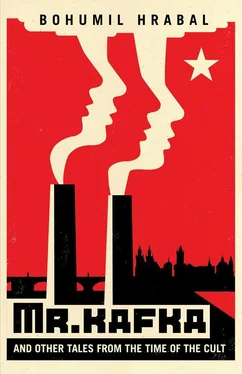“Right,” said the stonemason, his voice failing him. He stood with his legs braced, his white trouser legs and jacket flapping in the breeze. He leaned forward, propped his arms against the sandstone window frame, and stared across the city at the opposite river bank. The palms of his hands were dry.
“Seven people all told were killed in the building of it,” the sexton went on. “The first to die was the sculptor who designed it, and the last was a worker’s mate who came to work one Monday morning three sheets to the breeze and he put his foot through a board six levels up and fell head first off the scaffolding and smashed his skull on the Generalissimo’s little finger.”
Mr. Valerián and Mr. Mit’ánek entered the palace and followed the red carpet up the staircase, each carrying one end of the picture, so, from the side, they looked like the rectangular pig little children draw on walls. At the top of the stairs, they propped the painting up against the gilded wainscoting. “Maybe the porter was bullshitting,” said Mr. Mit’ánek.
Mr. Valerián entered the large salon on the second floor and, as if in a trance, walked past the paintings leaning against the wall. It was as though he were walking in and out of one mirror after another, one painting after another, as if he himself were Durynk. Ninety-six times he walked in and out of the same picture, until he reemerged into the hall under golden chandeliers and golden balustrades.
“He wasn’t bullshitting,” said Mr. Mit’ánek.
Mr. Valerián took hold of his painting and carried it roughly down the corridor and into the washroom, where he locked himself inside one of the cubicles. As Mr Mit’ánek stood at a urinal, pretending to relieve himself in case anyone walked in, he heard a strange sound. At first he thought Mr. Valerián must be having an attack of diarrhea, but then he recognized it as the sound of ripping canvas. The cubicle door opened, and Mr. Valerián emerged without the picture. He handed a small piece of canvas to Mr. Mit’ánek.
“A souvenir, from me,” he said with a forced laugh.
The strip showed the eyes of the wretched Durynk cut from the canvas with a knife, like eyes seen through a peephole in a door. Mr. Mit’ánek realized that the look in Mr. Valerián’s eyes was exactly the same, a look he hadn’t had back in the studio, but did now.
Mr. Valerián began to gag and turn pale. He ran down the red carpet, his arms wide, and staggered out into the sunlight. He saw the porter’s dark silhouette and then the large bucket looming in front of him and he threw up into it, feeling the metallic handle slip over his head and press against the nape of his neck. He felt like a dray horse, when the driver slips on a feedbag filled with oats.
“So you tried to bluff me,” the porter said sympathetically, wiping Mr. Valerián’s chest with a rag. “You submitted a Durynk, too, didn’t you?”
Mr. Valerián nodded, and tears rolled down his cheeks. Along the sand-strewn path two workers from a delivery service approached; in a strap sling, they carried a sandstone statue of a warrior dressed in animal skins brandishing a stone axe. They hurried up the stairs with the statue, their legs scissoring as they went, and when Mr. Valerián looked at them, his stomach began to heave again but he had nothing left to bring up, so he bellowed into the bucket as though he were blowing on a French horn. The porter watched the statue disappear up the stairs and then gave a whistle.
“Uh oh, you did a warrior statue too. Go on, admit it. You did, didn’t you?” The porter slapped Mr. Valerián on the back.
“How many warriors have you delivered so far today?” the porter shouted into the foyer.
“This is the eleventh,” one of the men shouted back.
“That’s quite a helping,” said the porter, and he carefully removed the bucket from Mr. Valerián’s neck, wiped his shirt front, and set the bucket down by the box hedge. .. “Vašek! My belt’s coming off! Stop throwing sand in Ferda’s eyes.”
“Out of curiosity, how many of those warriors have they brought in… I mean in total?” asked Mr. Mit’ánek.
“A hundred and ten,” said the porter. “Which is why I say, enough with the art already. This here’s the thing,” and he held up a little book, shaking it at them. “Nobody can trump Einstein! A great read, this, like a whodunit. So enough with the art already. Einstein predicted everything. He exposed all the old fantasies, completely trashed them. He said there was dark matter in the universe and sure enough, there was… Vašek! I’m taking my belt off!” The porter made to remove his belt, but then went on excitedly: “Einstein figured the earth wasn’t perfectly round, and sure enough, it wasn’t. He figured that the speed of light in a vacuum is independent of the speed of the light source. .. Vašek!… It’s like when a swallow dips down and touches the surface of the water with its wing. Einstein established the outer limits of speed, saying that no signal can travel faster than light, but… Vašek, that’s the goddamned limit!”… and in a sudden rage, the porter yanked off his belt and plunged into the bushes, bent a little boy across his knee, and thrashed him, while a second little boy sat sobbing his eyes out.
The stonemason cringed.
“Inside, the entire statue is made of solid concrete, reinforced with special underground buttresses that reach all the way across to the Sparta football stadium,” the sexton said. “They reckon the demolition will take thirty days.”
“Right,” the stonemason said, coughing nervously.
“I wonder why they don’t just leave all those Prague statues standing,” said the sexton, extending his telescope, then looking at his watch. “Think of all the statuary there’d be in Prague now, almost a thousand years’ worth! If they didn’t keep tearing them down, there’d be so many statues in Prague, you’d never have to fall on your face walking home drunk — there’d always be an arm of marble or sandstone to lean on.”
The porter did up his belt and took a deep breath. “So let’s say the swallow touches the water with its wingtips,” he continued, “and the ripples start to spread out across the water, but the speed of the ripples has nothing to do with how fast the swallow is flying. See what I’m saying?” he said to Mr. Mit’ánek.
“I see,” said Mr. Mit’ánek, and he looked at the boy, who was just standing there awkwardly. “You should tell that to Mr. Valerián here. He’s the artist. I’m just an auxiliary cop. What’s wrong with the lad’s shoulder?”
“Oh that? It’s nothing,” the porter said dismissively. “He was in his mother’s body longer than he should have been, so they had to break a bone or two to get him out. They broke his shoulder. When he’s seven, they’ll break it again and fix it for good. But back to this Einstein, d’you see what I’m getting at? Compared to this Jirásek competition?”
“I see,” said Mr. Valerián. “Can’t stop now, though. Must keep at it.”
“Right,” said the porter. He looked toward the bright red carpet, then picked up the bucket and the rag from beside the box hedge. “Another Lučan warrior!” he shouted, and hurried to meet the new arrival, holding out the bucket.
Mr. Valerián threw up briefly onto the lawn, then he and Mr. Mit’ánek walked quickly down the pathway, through the pleasure garden, past two artists who were just arriving, each carrying a canvas wrapped in sheets.
A flash of light, and a dark cloud of smoke erupted from the construction enveloping the statue, followed by an enormous thud. A kind of force ripped through it, the first level lifted slightly off the ground and the pipes whirled into the air like lances, spinning higher and higher, and when the force began to dissipate, they hung suspended for an instant, then rained down on the ground around the statue, creating a thicket of lance-like branches. Half the scaffolding was completely blown away, the other half separated from the statue but remained upright, tottering unsteadily like a ski jump on the verge of collapse. The statue now stood exposed, apparently stronger, more massive than ever, but tilted forward as though it were about to go crashing down on the city below. The wall of air the explosion had set in motion rushed across the city rooftops, causing the church bell to resonate faintly and the stonemason’s coveralls to flap like a flag in the wind.
Читать дальше












